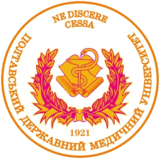Please use this identifier to cite or link to this item:
http://repository.pdmu.edu.ua/handle/123456789/3122| Title: | Поетика експресіонізму у прозі Густава Майрінка |
| Authors: | Бережанська, Юлія Валеріївна |
| Issue Date: | 2013 |
| Citation: | Бережанська Ю. В. Поетика експресіонізму у прозі Густава Майрінка : автореф. дис ... канд. філол. наук: 10.01.04 / Ю. В. Бережанська. – Сімферополь, 2013. – 20 с. |
| Abstract: | У дисертації вперше в українському літературознавстві досліджено прикмети експресіонізму та його австрійської специфіки на матеріалі прози Густава Майрінка. Експресіоністичний вектор художнього мислення Г. Майрінка визначає особливості наративної організації прози письменника (контрдискурсивні стратегії, техніка «ненадійної» нарації, змінна фокалізація, металепсис), вибір тематики і проблематики (топос Великого Міста, антивоєнний пафос, «бунт проти батьків», мотив протиборства чоловічого та жіночого начал тощо), а також діапазон художньо-виражальних засобів (афективна ритмізація, синестезійне оновлення мови, деперсоналізація тощо) прозової спадщини автора. Художній світ Г. Майрінка функціонує за принципами трансгресії і трансмутації, що обумовлюють своєрідність експресіонізму письменника як специфічного способу світовідтворення; В диссертации впервые в украинском литературоведении исследованы особенности экспрессионизма и его австрийской специфики на материале прозы Густава Майринка. Экспрессионистический вектор художественного мышления Г. Майринка определяет особенности нарративной организации прозы писателя (контрдискурсивные стратегии, техника «ненадежной» наррации, переменная фокализация, металепсис), подбор тематики и проблематики (топос Большого Города, антивоенный пафос, «бунт против отцов», мотив противоборства мужского и женского начал и т. д.), а также диапазон выразительных средств (аффективная ритмизация, синестезийное обновление языка, деперсонализация и т. д.) прозаического наследия автора. Художественный мир Г. Майринка функционирует по принципам трансгрессии и трансмутации, которые обусловливают своеобразие экспрессионизма писателя как специфического способа мировоспроизведения; The thesis is the first attempt in the Ukrainian literary criticism to research the features of Expressionism and its national singularity in Austria on the basis of Gustav Meyrink’s prose. The singularity of the Austrian Expressionism is conditioned by mental conservatism of the Austrians, the traumatic status change of the Dual Monarchy, the intense search for national identity, the increased aspiration for the artistic universalism, philosophical syncretism, «reconciliation» of the future and the past. The Expressionist vector of artistic thinking determines the narrative organization of G. Meyrink’s prose (counter-discourse strategies, the technique of «unreliable» narration, oscillations of focalization, metaleptic interaction of narrative levels). Expressionism is manifested not only in the assortment of themes and problems in G. Meyrink’s legacy (the antiwar pathos, the distorted and morbid atmosphere of the City, antagonism of generations, gender stereotypes and so on), but also in the range of stylistic devices (affective rhythmization, synaesthesic derivation, schematism of images). G. Meyrink’s Expressionist prose reveals numerous features of the Austrian mind-set (the development of «the Habsburg myth», the priority of Hasidic mysticism, the Janus-faced imagery); the particularities of the Viennese Expressionism (the leitmotif of the «inflamed brain», the art synthesis, the transfusion of disparate discourses); the major attributes of Expressionism in Prague (the increased «demonization» of the City, the intense interest to Jewish mystics and the «unreliable» narration technique), as well as some German traits (the use of Bavarian and Berlin dialectisms; the uncompromising critique of conventionalities; the urbanized representations of the City). G. Meyrink’s Expressionism operates on the principles of transgression and transmutation which determine the singularity of the writer’s method. The Expressionist transgression as the combination of modernist and avant-garde impulses is an important constructive agent of G. Meyrink’s artistic world which seeks to influence the external world, as well as to trigger the internal transformations. Transmutation in G. Meyrink’s prose productively embodies the Expressionistic desire of universal involvement, the aspirations to restore the harmony between «I» and the outer world. The project of the New Man in G. Meyrink’s writings implies the metaphysical transformation of personality, namely, the acquisition of the true sense of vision, the alchemical marriage with the Women or the irreversible dissolution within the Ancestor which is essential for reintegration of one’s divine nature. |
| Keywords: | літературний експресіонізм поетика художній образ мотив автор наратор контрдискурс рецепція литературный экспрессионизм поэтика художественный образ мотив автор нарратор контрдискурс рецепция literary Expressionism poetics artistic image motif author narrator counter-discourse reception |
| URI: | http://repository.pdmu.edu.ua/handle/123456789/3122 |
| Appears in Collections: | Автореферати Авторефетати та дисертації. Кафедра іноземних мов з латинською мовою та медичною термінологією |
Files in This Item:
| File | Description | Size | Format | |
|---|---|---|---|---|
| Poetyka_ekspresionizmu.pdf | 472,75 kB | Adobe PDF | View/Open |
Items in DSpace are protected by copyright, with all rights reserved, unless otherwise indicated.



